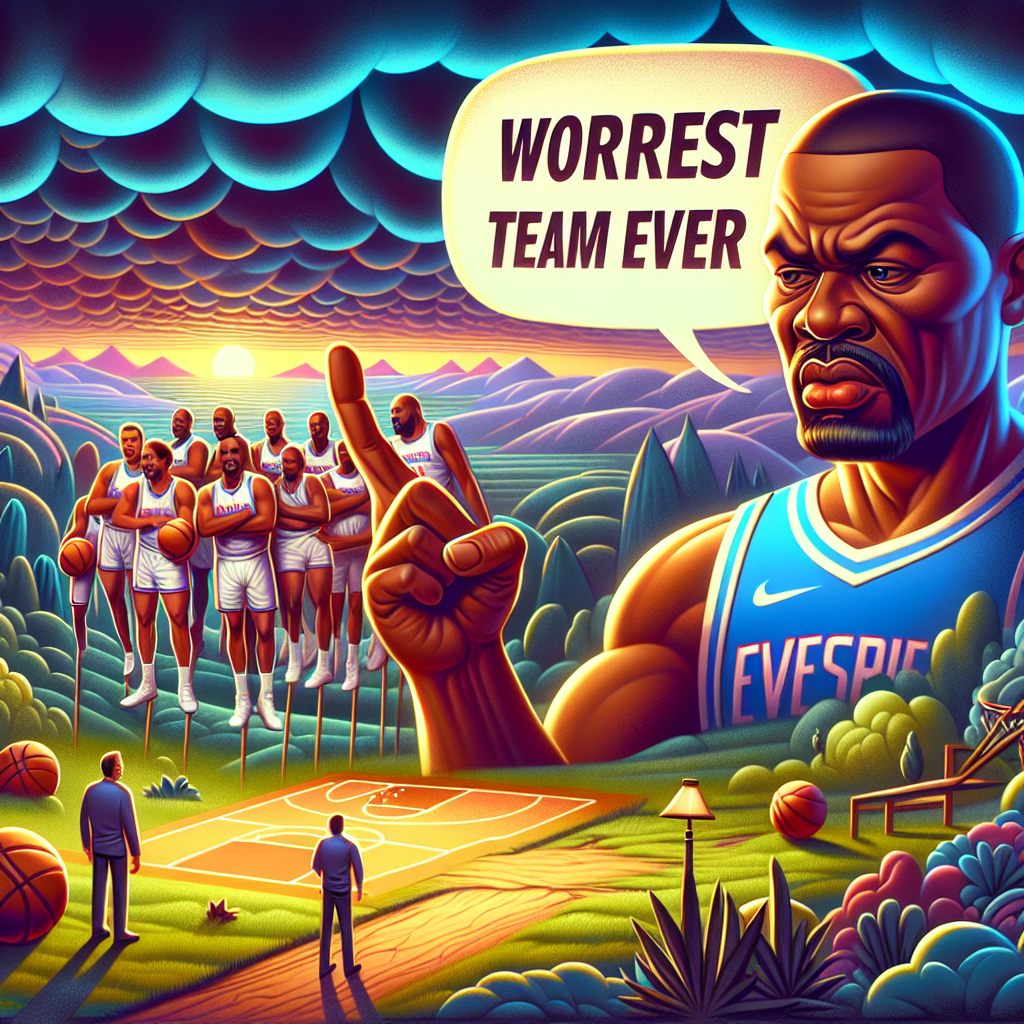Gilbert Arenas criticizes 2004 Team USA as the ‘worst team ever’

Reasons Why Gilbert Arenas Believes 2004 Team USA Was the Worst Ever
Former NBA player Gilbert Arenas recently made headlines when he criticized the 2004 Team USA basketball team as the “worst team ever.” This statement has sparked debate among basketball fans and analysts, with many questioning Arenas’ bold claim. However, when we take a closer look at the 2004 Team USA roster and their performance in the Olympics that year, it becomes clear why Arenas believes they were the worst team ever.
One of the main reasons why Arenas believes the 2004 Team USA was the worst ever is their lack of chemistry and cohesion on the court. The team was made up of a group of talented individual players, but they struggled to come together as a cohesive unit. This lack of chemistry was evident in their performance in the Olympics, where they suffered embarrassing losses to Puerto Rico, Lithuania, and Argentina.
Another reason why Arenas believes the 2004 Team USA was the worst ever is their lack of leadership. The team was missing a true leader who could rally the players and guide them through tough situations. Without a strong leader on the court, the team struggled to overcome adversity and lacked the mental toughness needed to compete at the highest level.
Additionally, the 2004 Team USA was criticized for their lack of commitment and dedication to representing their country. Many of the top NBA players at the time chose not to participate in the Olympics, citing various reasons such as fatigue, injuries, or personal reasons. This lack of commitment from some of the best players in the league weakened the team and hindered their chances of success.
Furthermore, the coaching staff of the 2004 Team USA was also called into question. Head coach Larry Brown and his staff were unable to effectively manage the team and make the necessary adjustments to improve their performance. Their coaching decisions were often criticized, and their inability to get the most out of the talented roster was a major factor in the team’s underwhelming performance.
In addition to their lack of chemistry, leadership, commitment, and coaching, the 2004 Team USA was also criticized for their poor defensive play. The team struggled to defend against their opponents and gave up easy baskets on a regular basis. Their lackluster defense was a major reason why they were unable to compete with the top teams in the Olympics and ultimately finished with a disappointing bronze medal.
Overall, Gilbert Arenas’ criticism of the 2004 Team USA as the “worst team ever” is not without merit. When we consider their lack of chemistry, leadership, commitment, coaching, and defensive play, it becomes clear why Arenas believes they were the worst team to ever represent the United States in international competition. While the 2004 Team USA may have been made up of talented individual players, their inability to come together as a team and perform at a high level ultimately led to their downfall.
Comparing 2004 Team USA to Other Underperforming Olympic Basketball Teams

Former NBA player Gilbert Arenas recently made headlines when he criticized the 2004 Team USA basketball squad as the “worst team ever” to represent the United States in the Olympics. This statement has sparked a debate among basketball fans and analysts, with many comparing the 2004 team to other underperforming Olympic basketball teams in history.
The 2004 Team USA, also known as the “Nightmare Team,” finished with a disappointing bronze medal at the Athens Olympics. This marked the first time since NBA players were allowed to compete in the Olympics in 1992 that the United States did not win the gold medal. The team was plagued by chemistry issues, lack of preparation, and a general lack of respect for the international competition.
One of the main criticisms of the 2004 Team USA was their lack of cohesion and teamwork on the court. The team was made up of individual superstars who were used to being the focal point of their respective NBA teams. This led to a lack of ball movement and a reliance on isolation plays, which ultimately hurt the team’s performance.
In contrast, the 1992 Dream Team is often regarded as the greatest basketball team ever assembled. Led by legends such as Michael Jordan, Magic Johnson, and Larry Bird, the Dream Team dominated the competition en route to winning the gold medal in Barcelona. The team’s chemistry and unselfish play were key factors in their success, as they were able to showcase the best of American basketball on the international stage.
Another underperforming Olympic basketball team that is often compared to the 2004 Team USA is the 2002 Team USA squad that finished sixth at the World Championships in Indianapolis. Coached by George Karl, the team struggled to find its identity and was plagued by injuries to key players such as Tracy McGrady and Paul Pierce. The team’s lackluster performance was a wake-up call for USA Basketball, leading to a renewed focus on selecting the right players and building a cohesive team for future international competitions.
The 2004 Team USA’s bronze medal finish in Athens was a wake-up call for USA Basketball, leading to a renewed focus on building a team that could compete at the highest level on the international stage. The 2008 “Redeem Team,” led by Kobe Bryant and LeBron James, restored American dominance in basketball by winning the gold medal at the Beijing Olympics. The team’s commitment to defense, unselfish play, and teamwork were key factors in their success, as they were able to redeem the disappointment of the 2004 team.
In conclusion, while the 2004 Team USA may have underperformed and faced criticism from Gilbert Arenas and others, they are not the only Olympic basketball team to fall short of expectations. The team’s lack of chemistry and preparation were key factors in their disappointing finish in Athens. However, the lessons learned from that experience helped pave the way for future success for USA Basketball on the international stage. As the debate continues over which team is the “worst ever,” it is important to remember that every team has its strengths and weaknesses, and that success in international competition requires a combination of talent, teamwork, and preparation.
Impact of Gilbert Arenas’ Criticism on the Legacy of 2004 Team USA
Former NBA player Gilbert Arenas recently made headlines when he criticized the 2004 Team USA basketball team as the “worst team ever.” This statement has sparked a debate among basketball fans and experts about the legacy of that particular team and its impact on the sport. In this article, we will explore the implications of Arenas’ criticism on the legacy of the 2004 Team USA and how it has shaped the perception of that team in the basketball community.
Arenas’ comments have reignited discussions about the 2004 Team USA, which was famously dubbed the “Nightmare Team” after their disappointing performance in the Athens Olympics. The team, which featured NBA superstars like Allen Iverson, Tim Duncan, and LeBron James, failed to live up to expectations and settled for a bronze medal, marking the first time since 1988 that the United States did not win gold in men’s basketball.
Critics of the 2004 Team USA point to a lack of chemistry and cohesion among the players as one of the main reasons for their underwhelming performance. The team struggled to adapt to the international style of play and faced stiff competition from other countries that had been steadily improving their basketball programs. Arenas’ criticism of the team as the “worst ever” has only added fuel to the fire, with many questioning the legacy of that particular squad.
Despite their shortcomings, the 2004 Team USA did have some bright spots. LeBron James emerged as a rising star during the tournament, showcasing his incredible talent and potential on the international stage. The team also featured veteran leadership from players like Tim Duncan and Allen Iverson, who provided valuable experience and guidance to their younger teammates.
However, these positives were overshadowed by the team’s overall lackluster performance and failure to bring home the gold medal. Gilbert Arenas’ harsh criticism of the team has further tarnished their legacy in the eyes of many basketball fans, who now view the 2004 squad as a disappointment rather than a powerhouse.
In the years since the 2004 Olympics, Team USA has bounced back in a big way, reclaiming their dominance in international basketball and winning gold medals in subsequent tournaments. The 2008 “Redeem Team” led by Kobe Bryant and LeBron James restored the United States’ reputation as a basketball powerhouse and solidified their status as the team to beat on the global stage.
Despite their redemption, the 2004 Team USA will always be remembered for their shortcomings and missed opportunities. Gilbert Arenas’ criticism has only served to reinforce this perception and raise questions about the legacy of that particular squad. While it is important to acknowledge the talent and effort of the players on the 2004 team, it is also crucial to recognize their failures and learn from them in order to avoid similar disappointments in the future.
In conclusion, Gilbert Arenas’ criticism of the 2004 Team USA has sparked a debate about the legacy of that particular squad and its impact on the sport of basketball. While the team had its share of talented players and positive moments, their overall performance fell short of expectations and left a lasting mark on their reputation. As basketball fans continue to reflect on the 2004 Olympics and the “Nightmare Team,” it is important to consider the lessons that can be learned from their experience and use them to improve and grow as a team.

